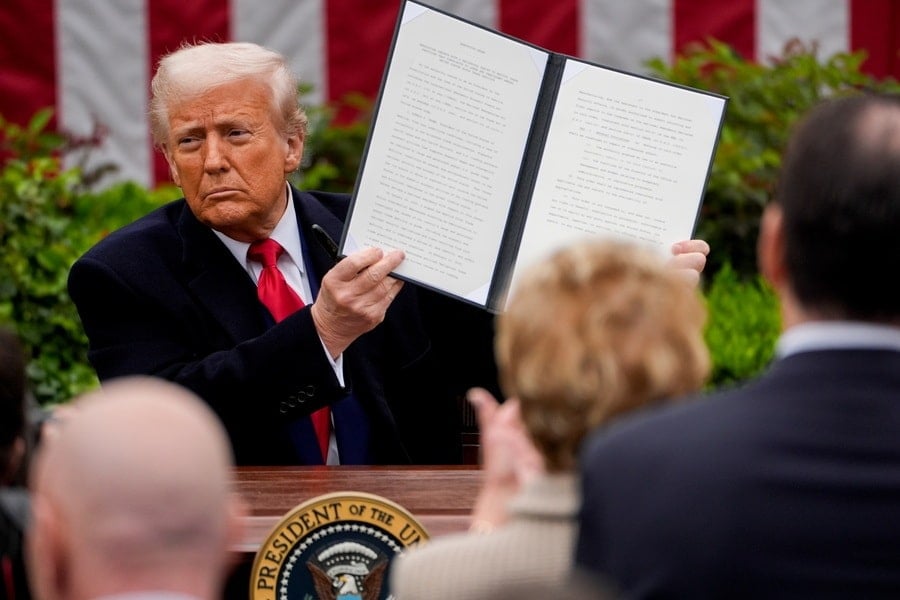

President Donald Trump on Wednesday unveiled expansive new tariffs in a major escalation of his trade war, with world leaders condemning his move and warning of countermeasures.
Trump, referring to the historic move as a “declaration of economic independence,” announced a baseline of 10 percent tariffs, with some countries the White House has deemed the “worst offenders” getting hit with higher rates. The new rates affect about 100 countries, with 60 of those facing the higher import taxes.
Trump’s reciprocal tariffs won’t match the ones foreign countries impose on the US unless a country already had a 10 percent US tariff. They also won’t stack on top of existing duties by sector.
“We will charge them approximately half of what they are and have been charging us, so the tariffs will be not a full reciprocal,” Trump said from the Rose Garden. “I could have done that, I guess, but it would have been tough for a lot of countries and we didn’t want to do that.”
For example, instead of matching the European Union’s 39 percent tariff on US goods, the new duty on the EU will be 20 percent instead. China, which was already slapped with a 20 percent tariff for its role in fentanyl trade, will be levied an additional 34 percent — half of the 67 percent tariff it imposes on the US — bringing its new rate to 54 percent.
Countries that will face higher reciprocal tariffs apart from China include, Vietnam (46 percent), Thailand (36 percent), Cambodia (49 percent) and Japan (24 percent).
Trump also imposed a 25 percent tariff on all foreign-made automobiles, which will take effect at midnight on the US east coast on Thursday.
Trump has argued the tariffs will stop Americans from being “ripped off,” pay down the national debt, and restore US manufacturing.
World leaders have reacted strongly, warning the tariffs could lead to a trade war. China said it would “resolutely” hit back and “take countermeasures to safeguard its own rights and interests”.
“China urges the United States to immediately cancel its unilateral tariff measures and properly resolve differences with its trading partners through equal dialogue,” said the commerce ministry.
European Commission president Ursula von der Leyen said the tariffs would have “dire consequences” for millions of people around the world.
“We [the EU] are already finalizing the first package of countermeasures in response to tariffs on steel,” said Von der Leyen. “We’re now preparing for further countermeasures to protect our interests and our businesses if negotiations fail.”
Japan’s trade minister, Yoji Muto, called the tariffs “extremely regrettable” and said all options were open. Asked if Japan would retaliate, he added: “We need to decide what is best for Japan, and most effective, in a careful but bold and speedy manner.”
Canadian Prime Minister Mark Carney said his country would fight back with countermeasures. “It’s essential to act with purpose and with force, and that’s what we will do,” he told reporters.
Mexico’s president, Claudia Sheinbaum, said she wouldn’t pursue a “tit-for-tat” strategy but that a “comprehensive programme” would be announced later today.
She added: “It’s not a question of if you impose tariffs on me, I’m going to impose tariffs on you. Our interest is in strengthening the Mexican economy.”
Australian Prime Minister Anthony Albanese said the 10 percent tariff on his country – the lowest level – was not reciprocal – and “not the act of a friend”. “It is the American people who will pay the biggest price for these unjustified tariffs,” he said.
Irish Prime Minister Micheal Martin added: “We see no justification for this. “More than €4.2bn worth of goods and services are traded between the EU and the US daily… Tariffs drive inflation, hurt people on both sides of the Atlantic, and put jobs at risk”.
US stock market futures fell sharply and Asian markets traded lower after Trump’s unveiled a baseline of 10% tariffs, with some countries the White House has deemed the “worst offenders” getting hit with much higher rates.
This is a developing story
Related: Experts Downplay Impact of Potential US Tariffs on Greece’s Economy
